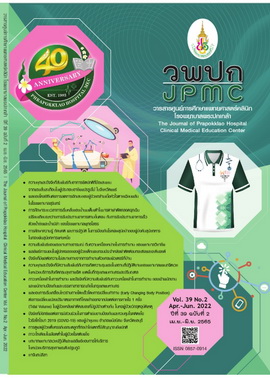The Study of The Duration of Onset of Lactation in Emergency Cesarean Delivery Case Comparison between Procedure Conventional Feeding and Early Feeding with Ginger Drinking Juice and Water at Buddhasothorn Hospital
Main Article Content
Abstract
BACKGROUND: Previous studies have shown that most mothers who gave birth through an emergency cesarean delivery face an issue with delayed onset of lactation. Alternatively, several reports showed that early feeding can rapidly stimulate breast milk production. As ginger is a medical herb that can increase breast milk stimulation, having the mother drink ginger juice and begin to feed the child early may stimulate and increase the breast milk supply of mothers who have had an emergency cesarean delivery.
OBJECTIVE: To study and compare the onset of lactation in emergency cesarean deliveries for mothers who engage in conventional feeding and those who engage in early feeding while drinking ginger juice and water.
METHODS: This study collected data from women who had an emergency cesarean delivery without complications. One hundred five women were divided into three groups of thirty-five; the groups were as follows: an early feeding group with ginger juice, a feeding group with water, and a conventional feeding procedure group. All three groups recorded information on the onset of lactation.
RESULTS: The results of the three different groups showed that the duration of onset of full breast with secretion in the early feeding group with ginger juice, the early feeding group with water, and the conventional feeding procedure group were 35.3±0.9, 41.0±10.0 and 50.5±10.1, respectively. Furthermore, the early feeding group with ginger juice had a shorter onset of lactation time than the early feeding group with water (p=0.02), and the early feeding group with water had a shorter onset lactation time than the conventional feeding procedure group (p<0.001).
CONCLUSIONS: The mothers who underwent an emergency cesarean delivery in the early feeding group with ginger juice had a shorter onset of lactation time than the early feeding group with water and the conventional feeding procedure group without serious complications.
Thaiclinicaltrials.org number, TCTR20211221003
Article Details

This work is licensed under a Creative Commons Attribution-NonCommercial-NoDerivatives 4.0 International License.
References
Intarasukum P. Onset of lactation after an uncomplicated cesarean delivery: a study between emergency cesarean delivery and elective cesarean delivery. Journal of Health Science 2014; 23:1058-66.
Deawvatanavivat N. The onset of lactation after an uncomplicated cesarean delivery: a randomized controlled study between early post-operative feeding and conventional feeding. Thai J Obstet Gynaecol 2010;18(2):70-6.
Paritakul P, Ruangrongmorakot K, Laosooksathit W, Suksamarnwong M, Puapornpong P. The effect of ginger on breast milk volume in the early postpartum period: a randomized, double-blind controlled trial. Breastfeed Med 2016;11:361-5.
U-chareankit A, Nawawongkhampa A, Sopantragool K, Chaicharean S. Effect of ginger drink on the quantity of lactation and flatulence in woman after cesarean section delivery. Uttaradit Hosp Med J 2014;29(3):42-53
Bumrungpert A, Somboonpanyakul P, Pavadhgul P, Thaninthranon S. Effects of fenugreek, ginger, and turmeric supplementation on human milk volume and nutrient content in breastfeeding mothers: a randomized double-blind controlled trial. Breastfeed Med 2018; 13:645-50.
Sassanarakkit S, Kaiwong S, Chittacharoen A. A Study on instant ginger drink effect in enhancing postpartum breastfeeding in immediate post cesarean delivery. J Med Assoc Thai 2019;102:259-63.
Bode AM, Dong Z. The amazing and mighty ginger. In: Benzie FF, Watchtel-Galor S, editors; Herbal medicine biomolecular and clinical aspects Oxidative stress and disease. New York: CRC Press-Taylor and Francis Group; 2011. p. 131-56.
Nommsen-Rivers LA, Dolan LM, Huang B. Timing of stage II lactogenesis is predicted by antenatal metabolic health in a cohort of primiparas. Breastfeed Med 2012;7:43-9.
Mawson AL, Bumrungphuet S, Manonai J. A randomized controlled trial comparing early versus late oral feeding after cesarean section under regional anesthesia. Int J Womens Health 2019;11:519-25.
Chantarasorn V, Tannirandorn Y. A comparative study of early postoperative feeding versus conventional feeding for patients undergoing cesarean section; a randomized controlled trial. J Med Assoc Thai 2006; 89 Suppl 4:S11-6.
Anh NH, Kim SJ, Long NP, Min JE, Yoon YC, Lee EG, et al. Ginger on human health: a comprehensive systematic review of 109 randomized controlled trials. Nutrients [Internet]. 2020[cited 2021 May 11];2(1):157.Available from: https://www.mdpi.com/2072-6643/12/1/157
Sugimoto K, Takeuchi H, Nakagawa K, Matsuoka Y. Hyperthermic effect of ginger (zingiber officinale) extract-containing beverage on peripheral skin surface temperature in women. Evid Based Complement Alternat Med [Internet]. 2018 [cited 2020 Sep 30];2018:3207623. Available from: https://downloads.hindawi.com/journals/ecam/2018/3207623.pdf
Sim TF, Hattingh HL, Sherriff J, Tee LBG. The use, perceived effectiveness and safety of herbal galactagogues during breastfeeding: a qualitative study. Int J Environ Res Public Health 2015;12:11050-71.
Forinash AB, Yancey AM, Barnes KN, Myles TD. The use of galactogogues in the breastfeeding mother. Ann Pharmacother 2012;46:1392-404.
Dilokthornsakul W, Rinta A, Dhippayom T, Dilokthornsakul P. Efficacy and safety of ginger regarding human milk volume and related clinical outcomes: a systematic review of randomized controlled trials. Complement Med Res 2022;29:67-73.

